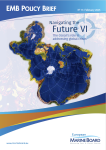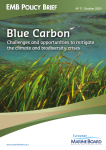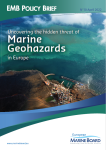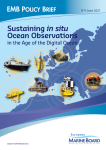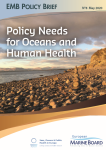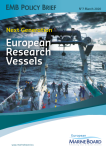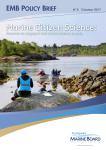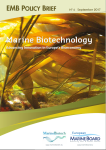Policy Briefs
Today, our society depends on critical coastal and marine infrastructure such as ports, telecommunication cables and renewable energy installations. With increasing human activities conducted in the marine environment and an increasing population living at the coast, society is becoming more exposed and vulnerable to the impacts of marine geohazards. This Policy Brief raises awareness about dormant geological risks in European coastal regions, and makes recommendations for future research and policy. It summarises the main messages and recommendations from the recent EMB Position Paper Nº26 on “Marine Geohazards: Safeguarding Society and the Blue Economy from a Hidden Threat”, published in December 2021.
This Policy Brief focuses on in situ Ocean observations and highlights their benefits, funding and governance challenges, and the investment needed for their transformation and sustainability. This document is the result of an ad hoc Working Group established by the European Marine Board to address this topic, in light of the UN Decade of Ocean Science for Sustainable Development, and the start of Age of the Digital Ocean.
This Policy Brief highlights the inextricable links between oceans health and human health. It presents the main challenges in moving towards a European policy framework that supports and enables Oceans and Human Health to be addressed in a holistic manner. It highlights the research, training, data, monitoring and funding needs to enable such a policy framework to be developed. This publication was produced together with the EU-funded SOPHIE project.
This Policy Brief outlines why we need research vessels, noting the multiple roles they play in supporting marine science and ocean observing. It presents an overview of the current European fleet and its capabilities, and highlights the importance of transnational access within this context. It also briefly outlines the concerns around training for vessel crew, marine technicians and shore-based staff. It then presents the main recommendations of EMB Position Paper 25. This publication summarises the main messages and recommendations of the recent EMB Position Paper 25 on “Next Generation European Research Vessels: Current Status and Foreseeable Evolution”, which was produced in collaboration with the European Research Vessel Operators (ERVO) community.
Policy brief showcases the latest scientific and technological advancements in marine biotechnology and explores future innovation.
